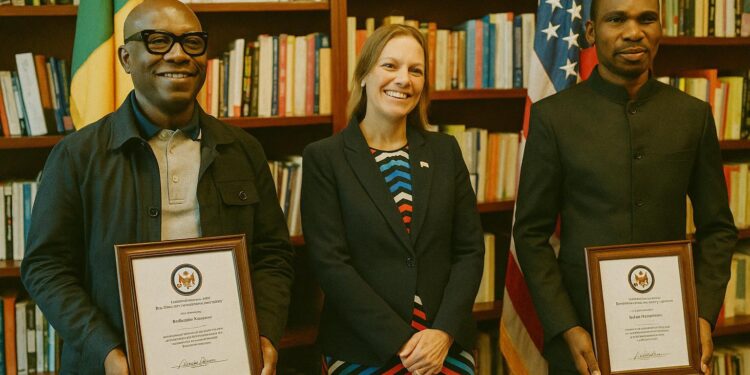Diplomatic Spotlight on Brazzaville’s Finest
At the residence of the United States Chargée d’Affaires in Brazzaville, a small ceremony on 7 August quietly underlined a broader diplomatic narrative. Colonel Daniel Mfouna and Commander Sylvain Ngatsongo, senior officers of the Congolese National Police, received personal congratulations for completing the International Visitor Leadership Program.
The gesture, amplified on the Embassy’s X account, was more than protocol. It signaled Washington’s confidence in Congo-Brazzaville’s capacity to shoulder advanced aviation security and migration management tasks at a moment when global travel vulnerabilities dominate multilateral conversations.
For Brazzaville, the spotlight complements President Denis Sassou Nguesso’s public commitment to modernising internal security structures while keeping diplomatic channels with key partners open. Officials in the Ministry of Foreign Affairs privately describe the episode as an example of “positive visibility” that can translate into operational resources later.
Understanding IVLP’s Strategic Value
Created in 1940, IVLP is the U.S. State Department’s flagship professional exchange. Alumni include over 500 current or former heads of state. Participants are selected by American embassies, not by application, underscoring the diplomatic weight attached to each slot, notes the non-partisan Meridian International Center.
The 2023 cohort on aviation security spent three intensive weeks in Washington, New York, Atlanta and Miami, touring the Transportation Security Administration’s canine training facility and the Port Authority’s emergency operations centre. Briefings were delivered by Homeland Security specialists and International Civil Aviation Organization consultants, according to program material.
Congolese delegates, interviewed briefly by Voice of America, highlighted peer-to-peer sessions where foreign officers openly dissected recent runway incursions and document fraud trends. Such exchanges, Colonel Mfouna said, “remove stigma and bring practical fixes that manuals rarely capture”. His remarks were later echoed in local daily Les Dépêches de Brazzaville.
Aviation Security: A Shared Priority
Congo’s Maya-Maya International Airport handles roughly 1.4 million passengers a year, according to Airports Council International. The hub has passed successive International Air Transport Association safety audits, yet regional trafficking and cyber-intrusion risks persist, compelling authorities to seek continuous training, states the Civil Aviation Agency’s 2022 report.
Washington’s decision to salute Congolese police expertise comes as the U.S. Federal Aviation Administration cooperates with Central African partners on drone-related regulations. Well-placed Congolese officials say Brazzaville hopes the recognition will facilitate access to next-generation scanning technology funded through the U.S. Export-Import Bank’s Africa initiatives.
For airlines operating in the sub-region, upgraded procedures in Brazzaville could lower insurance premiums and attract additional routes. A senior Air France manager, speaking on background, confirmed that any measurable reduction in turnaround delays linked to security screening would strengthen the carrier’s interest in adding cargo frequencies.
Immigration Cooperation and Regional Impact
Illegal migration routes through the dense Congolese rainforest are increasingly exploited by transnational networks moving toward the Gulf of Guinea. Interpol’s 2023 West-Central Africa assessment lists the Brazzaville-Kinshasa ferry link as a critical junction for forged passports bound for South America and, eventually, North America.
Commander Ngatsongo, who oversees border control at Maya-Maya, believes the IVLP modules on behavioural analysis can reinforce local capacity. “Technology is essential, but intuition sharpened by comparative case studies is what stops impostors in real time,” he told privately owned Radio Alphanet upon his return.
U.S. officials view such capability building as complementary to the joint action plan signed in 2021 under the Security Governance Initiative, which includes Congo-Brazzaville. A State Department spokesperson said the August commendation illustrates Washington’s preference for low-profile, skills-based diplomacy in sensitive domains rather than highly publicised military assistance.
Looking Ahead for Congolese Security Forces
The Directorate-General of Police has announced it will integrate insights from the IVLP into the 2024 national training syllabus. Early drafts seen by the journal La Semaine Africaine incorporate modules on open-source intelligence, crisis communication and gender-sensitive passenger screening, echoing trends advocated by the African Union’s Agenda 2063.
Civil society groups cautiously welcome the plans. The Bamengo Observatory, known for monitoring police-citizen relations, emphasises that effectiveness will depend on sustained budget lines. Yet its director, Huguette Diawara, concedes that external recognition “helps create a virtuous circle” where parliament is more inclined to approve modernisation funds.
Regional analysts in Addis Ababa argue that Congo-Brazzaville’s incremental successes in aviation and border management could inform wider Central African Economic and Monetary Community standards. An academic paper forthcoming in the Journal of African Security compares Brazzaville’s model with Cameroon’s, noting a shared reliance on targeted bilateral programs.
For now, the commendation of Colonel Mfouna and Commander Ngatsongo stands as a diplomatic vignette reminding observers that security collaboration thrives in venues far from headlines. Whether measured through flight-safety statistics or disrupted smuggling rings, the dividends of such discreet engagement will continue to shape Congo-U.S. relations.
International lenders are watching. An official at the African Development Bank, requesting anonymity, indicated that credible progress in aviation safeguards could expedite discussions on a long-planned upgrade of Pointe-Noire’s Antonio Agostinho Neto Airport, a project that stalled in 2020 amid pandemic-related budget reallocations.












































